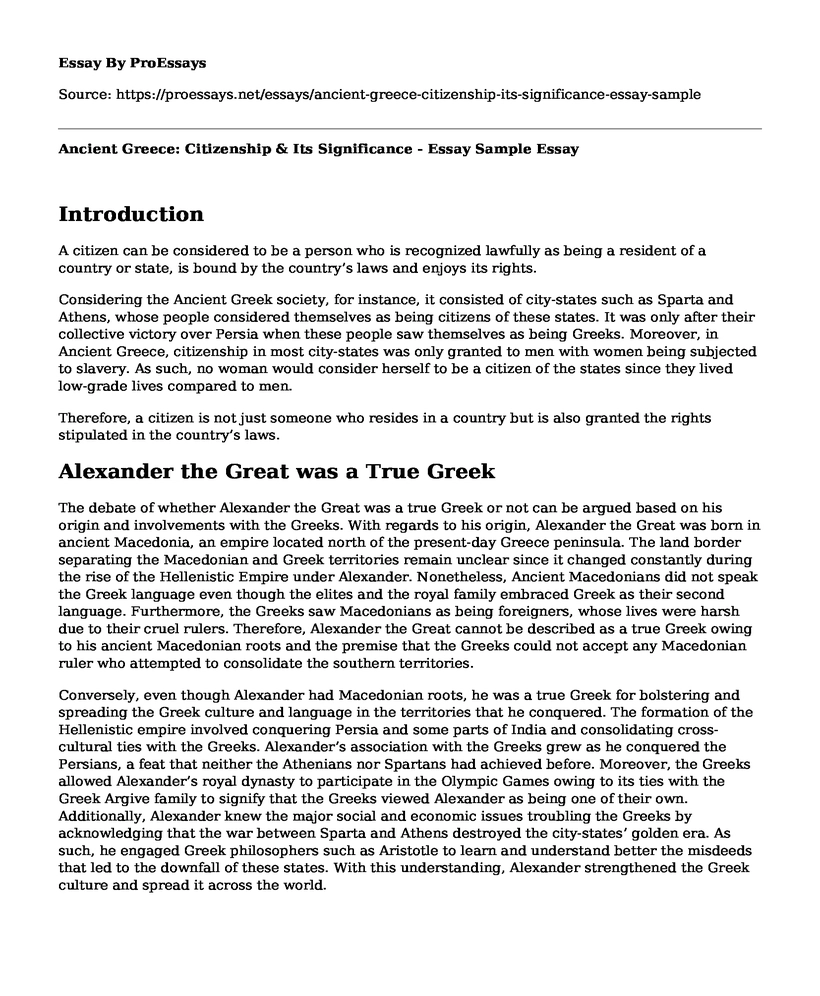Introduction
A citizen can be considered to be a person who is recognized lawfully as being a resident of a country or state, is bound by the country’s laws and enjoys its rights.
Considering the Ancient Greek society, for instance, it consisted of city-states such as Sparta and Athens, whose people considered themselves as being citizens of these states. It was only after their collective victory over Persia when these people saw themselves as being Greeks. Moreover, in Ancient Greece, citizenship in most city-states was only granted to men with women being subjected to slavery. As such, no woman would consider herself to be a citizen of the states since they lived low-grade lives compared to men.
Therefore, a citizen is not just someone who resides in a country but is also granted the rights stipulated in the country’s laws.
Alexander the Great was a True Greek
The debate of whether Alexander the Great was a true Greek or not can be argued based on his origin and involvements with the Greeks. With regards to his origin, Alexander the Great was born in ancient Macedonia, an empire located north of the present-day Greece peninsula. The land border separating the Macedonian and Greek territories remain unclear since it changed constantly during the rise of the Hellenistic Empire under Alexander. Nonetheless, Ancient Macedonians did not speak the Greek language even though the elites and the royal family embraced Greek as their second language. Furthermore, the Greeks saw Macedonians as being foreigners, whose lives were harsh due to their cruel rulers. Therefore, Alexander the Great cannot be described as a true Greek owing to his ancient Macedonian roots and the premise that the Greeks could not accept any Macedonian ruler who attempted to consolidate the southern territories.
Conversely, even though Alexander had Macedonian roots, he was a true Greek for bolstering and spreading the Greek culture and language in the territories that he conquered. The formation of the Hellenistic empire involved conquering Persia and some parts of India and consolidating cross-cultural ties with the Greeks. Alexander’s association with the Greeks grew as he conquered the Persians, a feat that neither the Athenians nor Spartans had achieved before. Moreover, the Greeks allowed Alexander’s royal dynasty to participate in the Olympic Games owing to its ties with the Greek Argive family to signify that the Greeks viewed Alexander as being one of their own. Additionally, Alexander knew the major social and economic issues troubling the Greeks by acknowledging that the war between Sparta and Athens destroyed the city-states’ golden era. As such, he engaged Greek philosophers such as Aristotle to learn and understand better the misdeeds that led to the downfall of these states. With this understanding, Alexander strengthened the Greek culture and spread it across the world.
Cite this page
Ancient Greece: Citizenship & Its Significance - Essay Sample. (2023, Aug 16). Retrieved from https://proessays.net/essays/ancient-greece-citizenship-its-significance-essay-sample
If you are the original author of this essay and no longer wish to have it published on the ProEssays website, please click below to request its removal:
- DuBois and Washington Essay Sample
- The United States Racial History - Essay Sample
- Fracking and the Impacts Essay Example
- Questions and Answers About Derek Black Paper Example
- Industrial Revolution in Latin America: Power Transfer, Resistance, and Revolt - Essay Sample
- Post-WWII U.S.A.: Five Significant Historical Events - Essay Sample
- Essay Sample on Intelligence World: Surveillance & Information Processing Post-9/11







